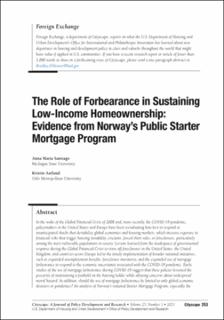| dc.description.abstract | In the wake of the Global Financial Crisis of 2008 and, more recently, the COVID-19 pandemic, policymakers in the United States and Europe have been reevaluating how best to respond to unanticipated shocks that destabilize global economies and housing markets, which increase exposure to financial risks that trigger housing instability, evictions, forced short sales, or foreclosures, particularly among the most vulnerable populations in society. Lessons learned from the inadequacy of governmental response during the Global Financial Crisis to stave off foreclosures in the United States, the United Kingdom, and countries across Europe led to the timely implementation of broader national initiatives, such as expanded unemployment benefits, foreclosure moratoria, and the expanded use of mortgage forbearance to respond to the economic uncertainty associated with the COVID-19 pandemic. Early studies of the use of mortgage forbearance during COVID-19 suggest that these policies lessened the precarity of maintaining a foothold on the housing ladder while allaying concerns about widespread moral hazard. In addition, should the use of mortgage forbearance be limited to only global economic disasters or pandemics? An analysis of Norway’s national Starter Mortgage Program, especially the role of local municipalities in the use of discretion, leniency, and forbearance, provides relevant insights for the design of mortgage programs that sustain low-income homeownership both in times of national economic growth, as well as during crises. This article examines how municipal discretion, leniency, and forbearance in a public starter mortgage program post-mortgage origination help to sustain homeownership among vulnerable families and mitigate mortgage defaults that lead to forced short sales. Offering forbearance to vulnerable homeowners when it is needed post-origination supports the sustainability of low-income homeownership, does not produce widespread moral hazard, and protects both national and municipal financial investments in public mortgage programs. | en_US |
